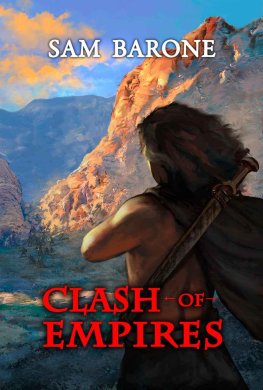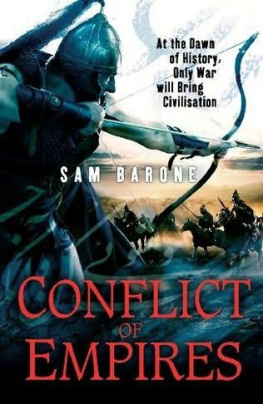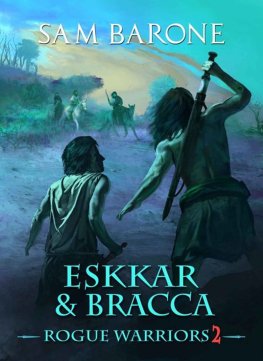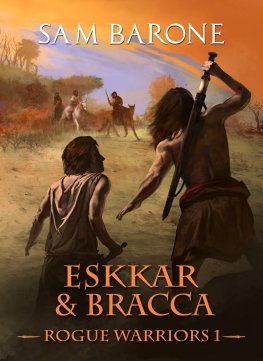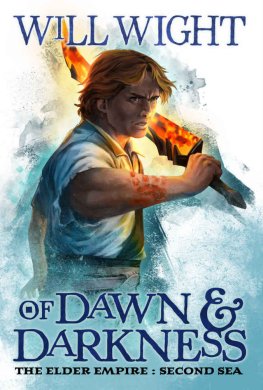Sam Barone - Dawn of Empire
Here you can read online Sam Barone - Dawn of Empire full text of the book (entire story) in english for free. Download pdf and epub, get meaning, cover and reviews about this ebook. genre: Adventure. Description of the work, (preface) as well as reviews are available. Best literature library LitArk.com created for fans of good reading and offers a wide selection of genres:
Romance novel
Science fiction
Adventure
Detective
Science
History
Home and family
Prose
Art
Politics
Computer
Non-fiction
Religion
Business
Children
Humor
Choose a favorite category and find really read worthwhile books. Enjoy immersion in the world of imagination, feel the emotions of the characters or learn something new for yourself, make an fascinating discovery.

- Book:Dawn of Empire
- Author:
- Genre:
- Rating:3 / 5
- Favourites:Add to favourites
- Your mark:
- 60
- 1
- 2
- 3
- 4
- 5
Dawn of Empire: summary, description and annotation
We offer to read an annotation, description, summary or preface (depends on what the author of the book "Dawn of Empire" wrote himself). If you haven't found the necessary information about the book — write in the comments, we will try to find it.
Dawn of Empire — read online for free the complete book (whole text) full work
Below is the text of the book, divided by pages. System saving the place of the last page read, allows you to conveniently read the book "Dawn of Empire" online for free, without having to search again every time where you left off. Put a bookmark, and you can go to the page where you finished reading at any time.
Font size:
Interval:
Bookmark:
Sam Barone
Dawn of Empire
Prologue
The eastern bank of the river Tigris, 3158 B.C.E
The village lay before him like a lamb trapped by a pack of wolves.
Thutmose sin halted his sweat soaked horse on the crest of the hill, while his men formed up on each side. He surveyed the plain beneath him, taking in the crops in the fields and the irrigation canals that watered them. His eyes soon fixed on the village barely two miles away.
There the Tigris curled sharply around the cluster of mud huts and tents that nestled against it. Today the river that brought the very sustenance of life to the dirt eaters would be the obstacle that prevented their escape.
Those who hadnt fled already, Thutmose sin corrected himself. He had planned to catch the village by surprise, but word had preceded his band, as it so often did. The warriors had ridden hard for five days with little sleep. Despite that effort, the dirt eaters had received a few hours warning. News of his approach must have traveled down the river, faster than a man on a horse. Even now, Thutmose sin could see a few small boats paddling frantically to the far side of the Tigris. Those lucky ones would use the river to elude the fate he had planned for them.
His men had settled into place. Nearly three hundred warriors formed a single line across the hilltop, with Thutmose sin at their center. Each man strung his bow, unslung his lance, and loosened the sword in his scabbard. They had done this so many times that now they spoke little and needed few commands, as they prepared themselves not for battle but for conquest. Only after the weapons were ready did they look to themselves.
Every rider drank deeply from his water skin, then emptied what remained over the head and neck of his horse. There would be plenty of water for both man and beast in the village.
His second in command, Rethnar, pulled up just behind him. The men are ready, Thutmose sin.
The leader turned his head, saw the eagerness in Rethnars face, and smiled at the mans excitement. Thutmose sin looked left and right along the line, and saw that every tenth man had raised bow or lance into the air. The warriors were more than ready. Their reward for the days of hard riding awaited them. Then let us begin.
With a touch of his heel to the horses ribs, Thutmose sin started the descent, the men following his lead. They took their time negotiating the downslope. With fresh horses, they would have raced down the incline and covered the last two miles in an exuberant rush. But after five days of riding, no man wanted to risk a valuable but weary horse-not with the end of their journey so near.
When they reached the plain, the line of horsemen became more ragged as the land flattened out. Small bands of riders detached themselves from the wings and began sweeping the countryside. They would search the outlying fields and scattered farmhouses, driving any inhabitants toward the village.
The main body of warriors cantered through fields of golden wheat and barley, Thutmose sin at their head. They soon reached the broad, well trodden path that led up to the village. Two minutes at a smooth gallop and they had passed the outermost dwellings.
Now the youngest warriors on the freshest horses took the lead, their war cries ringing over the thudding of the horses hooves. They rode past a few scattered dirt eaters, ignoring the screaming women, frightened men, and crying children. A rough wooden fence as tall as a man might have slowed them for a moment, but the crude gate stood open and undefended. The warriors swept through unopposed.
Thutmose sin saw the first dirt eater die. An old man, stumbling in fear, tried to reach the safety of a hut. A warrior struck downward with his sword, then raised the now bloodied blade high into the air and shouted his war cry. Arrows snapped from bows, striking down men and women caught in the open. The riders fanned out, some dismounting to search the huts, sword or lance in hand, looking for victims. Anyone who resisted would die, of course, but many would be killed just for the sport or to satisfy a thirst for blood. The rest would be spared. The Alur Meriki needed slaves, not bodies.
Thutmose sin ignored the clamor as he rode slowly through the village, the ten members of his personal guard now surrounding him in the narrow lane. He saw that a few of the dwellings stood two stories tall, a display of their owners wealth and prestige. Some houses hid behind high mud walls, while others had small gardens setting them back from the lane.
He reached the gathering place at the heart of the village, a large open space with a wide stone well in its center. More than a dozen carts, their dirty linen awnings flapping in the light breeze, crowded the marketplace.
A few still had their wares upon them, though all stood deserted. A rich village, as his scouts had promised.
After a pause to let the horses drink some water from the well, Thutmose sin picked out a wider lane that led toward the rear of the village. They followed its path until they reached the river. Here he halted, then slid easily to the ground, handing the halter to one of his men. A wooden dock extended a dozen paces into the Tigris. Walking to the jettys end, he tightened the wide strip of blue cloth embroidered with red thread that held his hair away from his eyes. Then he stopped and stared at the opposite bank.
Even at this fording place in midsummer, the Tigris reached nearly to the tops of its wide banks and flowed deeper than a mans height in places.
A ferry provided passage to the other side, but the abandoned craft sat on the opposite bank, along with three smaller vessels, all empty. He noticed that the flat sided ferry rested at an odd angle. Some dirt eaters must have opened its bottom.
On the opposite shore, the land rose steeply into a hillside dotted with date palms and poplars. Thutmose sin could see hundreds of people moving frantically up those slopes, some leading animals, others carrying their meager belongings, men helping their women and children. Most followed a crooked road that climbed toward a gap between the nearest hills. Almost all stole quick glances back toward the river, terrified that the grim riders would pursue them. The cowardly dirt eaters would run as far as they could, for as long as they could, then hide in the rocks and caves, shaking with fear and praying to their feeble gods for deliverance from the Alur Meriki.
Theyd slipped beyond his reach, and the knowledge enraged Thutmose sin, though he kept his face emotionless. The tired horses didnt have the strength to fight the current, let alone chase fleeing villagers, nor did they have the means to bring any captives or goods back to this side of the river.
He hated the Tigris, hated all rivers almost as much as he hated the dirt eaters who dwelt beside them. The rivers with their boats that could travel farther and faster than a galloping horse while carrying men and their burdens. More important, the flowing waters gave life to villages abominations-such as this, and let them grow large and prosperous.
Thutmose sin took a deep breath, then walked back up the jetty. Nothing showed of his disappointment. Thutmose sin swung back onto his horse and led his bodyguards back into the village, where the captives la-ments rose to greet him. When he reached the well, Rethnar was waiting.
Hail, Thutmose sin. A fine village, isnt it?
Hail, Rethnar. Thutmose sin answered formally, to affirm his authority. The two men were of much the same age, a few months under twenty five, but Thutmose sin commanded most of the men, and the clans sarrum, or king, had given him responsibility for the raid. The fact that the sarrum happened to be Thutmose sins father made no difference in his authority.
Yes, but too many escaped across the river.
Font size:
Interval:
Bookmark:
Similar books «Dawn of Empire»
Look at similar books to Dawn of Empire. We have selected literature similar in name and meaning in the hope of providing readers with more options to find new, interesting, not yet read works.
Discussion, reviews of the book Dawn of Empire and just readers' own opinions. Leave your comments, write what you think about the work, its meaning or the main characters. Specify what exactly you liked and what you didn't like, and why you think so.

